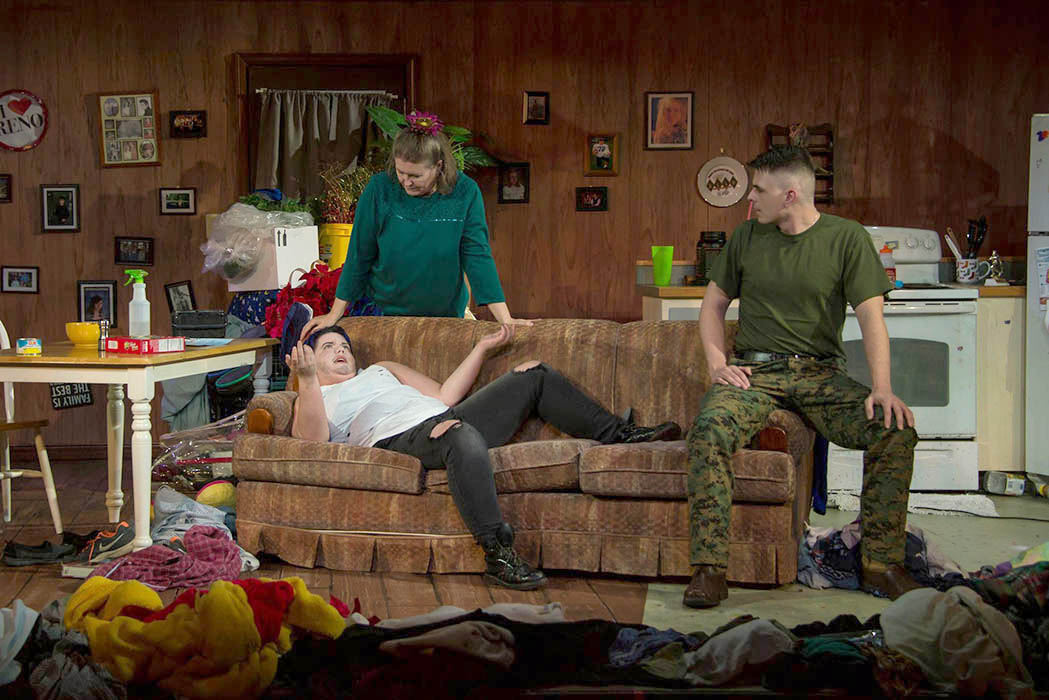As the lights come up on Taylor Mac’s Hir, which opened last Friday at Flying Anvil Theatre, the audience may believe for an instant that it has stumbled onto a contemporary update of the typical dysfunctional family comedy—perhaps a messier, more bizarre version of You Can’t Take It With You. We see the living room and kitchen of a suburban middle-class house, albeit one that could easily suggest the signs of a ransacking that was never cleaned up. What was probably once a living room of questionable taste has now been rendered even more unusable—piles of clothing and god-knows-what cover the floor, stacks of boxes and junk block the front door, and odd chotzkas and pictures seem randomly scattered about the walls. As an air conditioner whirrs incessantly, an older man, dressed in a clown wig and a woman’s night gown, stares wild-eyed from a shabby chair.
But wait — this terrific production of Hir—directed by Casey Sams—is anything but a typical comedy about likable eccentrics. Instead, its black comedy realism of domestic chaos has been taken to the next level, the audience teetering on the line between laughing at its absurdity and wincing from the inarguable reality of it all.
The ringmaster of this domestic chaos is Paige (Jayne Morgan), the mother and wife of the four character household. Morgan, also the artistic director of Flying Anvil and the director of many of its productions, has leapt into the role with a performance that is not only a masterpiece of dramatic construction and comic delivery, but is also a carefully played out examination of psyche. Morgan descends through layers of her character’s depth, uncovering an uncomfortable assortment of bits and pieces along the way.

The reveal begins as Paige’s son Isaac (Michael Marks), returns home “from the wars” and a stint in the Marine Corp where his job was collecting body parts for the Mortuary Affairs Department. Forced to enter the house by way of the back door because of the piles of junk, Isaac is astounded to find that the old man in the clown wig and makeup is his father, Arnold (David Silverthorn). Unknown to Isaac, Arnold has suffered a debilitating stroke while he was away and speaks only in mysterious, single-word grunts. Paige dresses Arnold for her own amusement and controls his childish behavior by spraying him with a water bottle, all the while keeping him quasi-sedated with a shake of various pills and estrogen.
The fourth member of the household is Max (Ezra Brown), Issac’s sister, who is in an advanced stage of a gender transformation, taking testosterone treatments and wallowing in the psychological labyrinth of altered identities. Max, searching perhaps vainly for an identity, has ironically bought into the concept of gender-neutral pronouns, insisting on “ze” rather than “he” or “she”, and “hir” (pronounced “here”) instead of “him” or “her” — the motivation for the title.
As the comical eccentricity of the domestic situation devolves into something much darker and much more poisonous, we discover that the tipping point into domestic chaos was the racist and xenophobic Arnold losing his job as a Roto-Rooter plumber to a Chinese-American woman. Paige’s mistreatment and humiliation of him, we find, is payback for the years of physical and mental abuse that he heaped on her and the family. Silverthorn is masterful in allowing little vestiges of his hateful past to glimmer through his current state, in which he is little more than an abused pet forced to sleep in a box.
We also learn that Isaac is not without his own demons, having been dishonorably discharged from the Marines for drug abuse. Demons aside, Isaac takes pity on his father’s state and attempts to show support for Max’s crisis, showing an empathy and selflessness that his family members seem to lack. Yet, he is appalled by the situation manufactured by Paige amid her insistent cries of “paradigm shift.” Trying to halt Paige’s alteration of family normality, Isaac inspires resistance from Paige and opens new wounds.
As our laughter at comedy turns to an examination of identity, playwright Mac suggests that Paige’s “paradigm shift”, Max’s identity crisis, and Arnold’s mental departure are, in fact, the same uncomfortable thing. Director Sams and Ms. Morgan allow the audience to feel, not only this discomfort, but also the underlying pathetic sadness. In Hir, Mac seems to be telling us that hatred eventually consumes everything—even our own identities.
Hir continues at Flying Anvil Theatre, 1300 Rocky Hill Road, through October 21.
Tickets and Information
An earlier version of this review contained a misspelling of the playwright’s name. The playwright is Taylor Mac.






